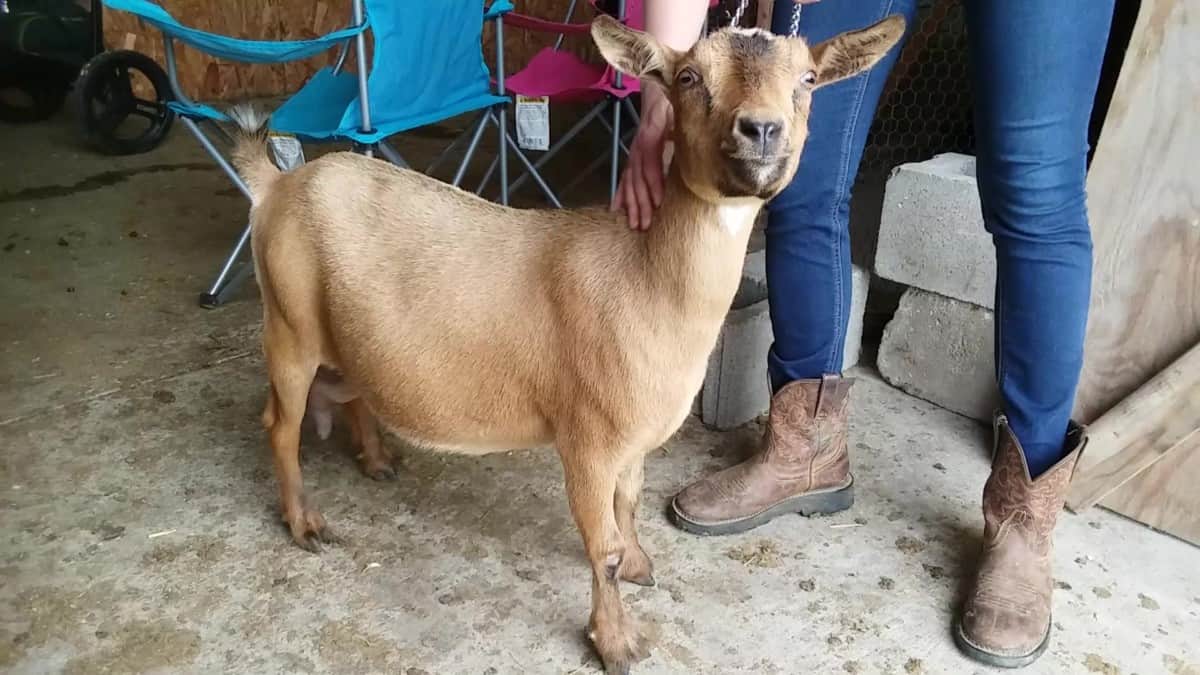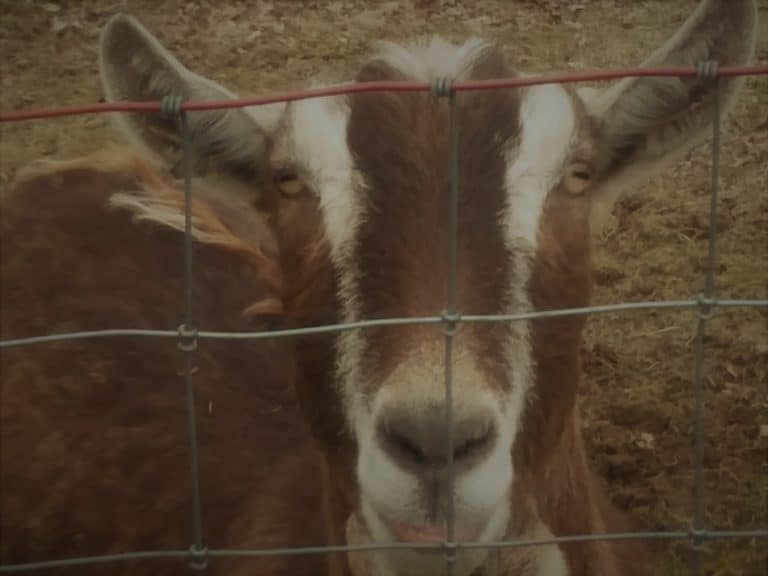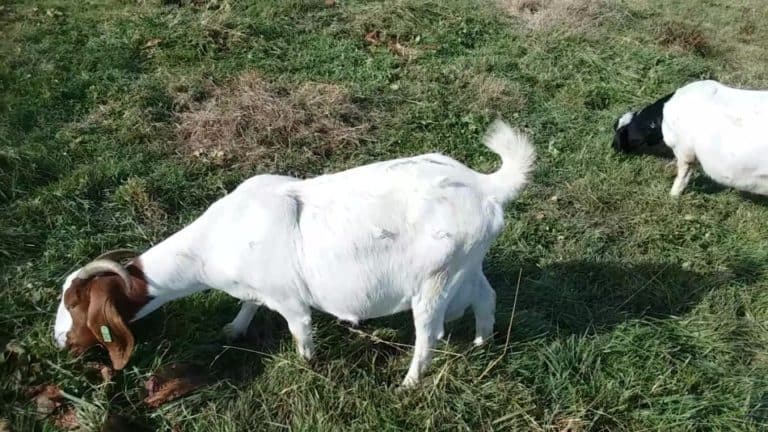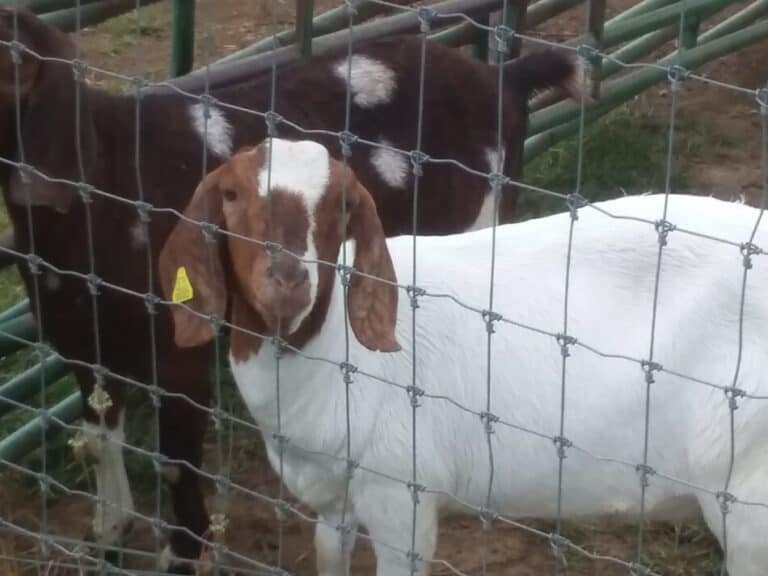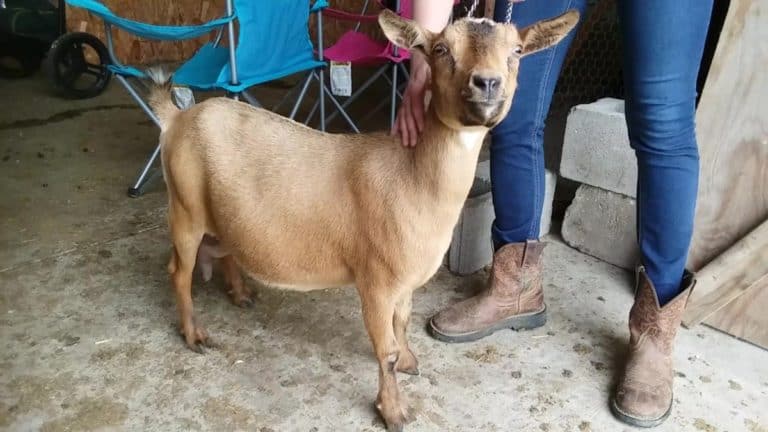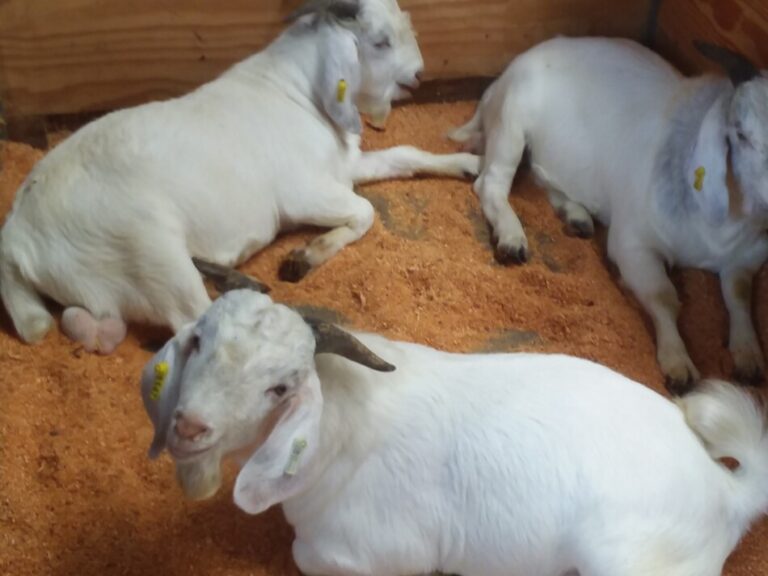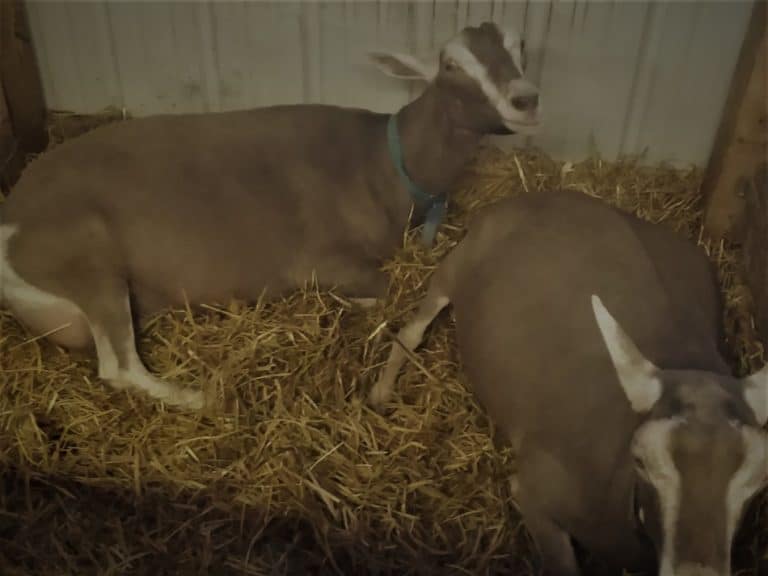Nigerian Dwarf: A Wonderful Goat In A Small Package
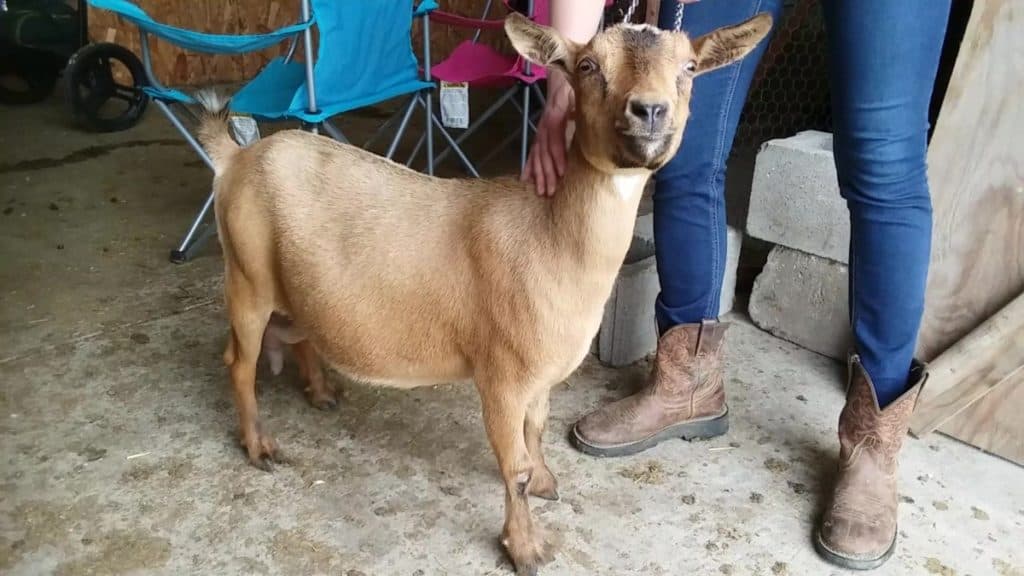
Thinking about getting a few goats? Are you looking for a smaller breed that eats less and is easier to contain?
Nigerian Dwarf goats are growing in popularity, and for good reason!
Nigerian Dwarf goats are an increasingly popular for backyard goat herds due to their small size, friendliness, and versatility.
In our area of Ohio, backyard goats are actually pretty popular.
It is very likely that if a family with a small shed and a fenced in yard has livestock it will be a few goats.
With lots of goats around the area which breed do you choose?
The Nigerian Dwarf goat is a great option for the new goat owner to consider.
14 Common Goat Breeds is an article I wrote to give you a quick overview of the common goat breeds you may run across when searching out the perfect breed for you and your family.
Nigerian Dwarf goats are friendly
I was at a dairy goat show and started talking to some of gals waiting to show their goats, their classes hadn’t come up yet.
These gals had a little herd of ready to show goats that were patiently waiting for their turn in the show ring.
The goats were little and had all sorts of color patterns, and a few different body types as well.
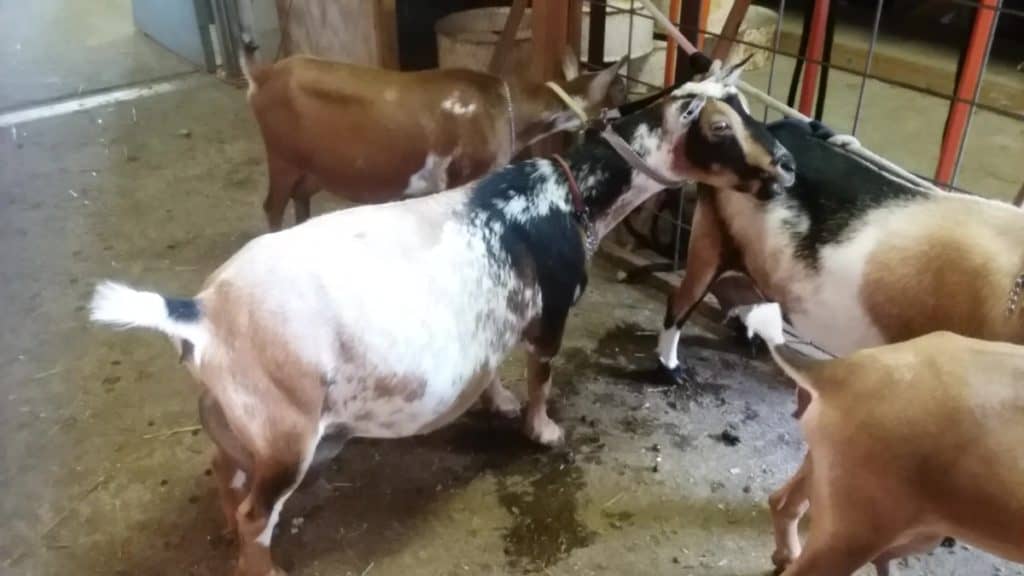
Turns out these were Nigerian Dwarf dairy goats from Critter Patch Farm in Massillon, Ohio.
Critter Patch has a website with great pictures if you are interested in seeing some specific goats, check out their website CritterPatchFarm.com.
All the goats pictured in this article are from this farm, as well.
Nigerian dwarfs are fun, friendly little goats that would be a great goat option for you to choose.
Nigerian Dwarfs are family friendly
Nigerian dwarfs are small for goats, adult does weigh 50-60 pounds when mature.
Billies weigh a bit more and for their size have an impressively long beard!
This is a smaller sized animal, so kids can do more with the animals you have at home when you choose a smaller breed.
When I was watching the goat show, I noticed many of the other breeds of goats that had a younger child showing the goat had to have an adult right there helping with the goat.
With the Nigerians, the younger showmen were in the ring by themselves, since they can handle the goat themselves.
Feeding Goats For Beginners gives you basic feeding instructions to get you started and a few tips to know when you need to change your goat’s feeding program.
Smaller goats eat less
Now on to the economics of it all.
Especially if you just want to keep a few goats because you enjoy having goats around, why not keep your feed expenses lower?
Smaller goats eat less, so cost less throughout the year for upkeep than would a bigger animal.
This means less hay and grain carrying for you and fewer trips to the feed store and/or hay auction to fill up with bales!
I know in the summer when our animals are on grass, I tend to forget about lugging around hay.
In the winter, I quickly remember why I like summer so much!
Nigerians are easier to contain than other goats

Being a shorter goat has advantages for fencing as well. Goats are fun but also curious and love to climb and get out of their pen.
Shorter goats make containment easier!
Additionally, smaller animals can be transported in a vehicle that you already have, so you don’t need to have a trailer.
Sure a trailer would be great, especially if you are moving a larger group of goats, but if you just need to take a few somewhere they would fit in a dog carrier if that is what you have available.
Upgrade when you can of course but starting small will work out here.
The most likely scenario for a new goat owner needing to transport one or two goats is if you decide you want to breed your female but do not have a billy.
Your Nigerian doe could easily be put into the dog carrier and taken to the farm with the billy.
Small body size can really come in handy, transportation wise!
Goat Care shows you some of the basics you’ll need to have figured out for your goats.
Perfect goat for smaller pastures
If you have a large yard or a small pasture a few Nigerian dwarfs would be perfect, since all herd animals need to live with at least one buddy.
All of the goats would have enough space and food in an area that would become overwhelmed with the same number of bigger goats.
Nigerian Dwarf goats can be pets
While Nigerians are a dairy animal they do not have to be kept as a dairy animal. They can be and often are kept as pets.
Or they can just raise their own babies and the milk supply will adjust to the needs of the kids (baby goats).
One of my favorite attributes of goats is that they are friendly. We have one and she seeks us out, just like a dog.
Most goats are people oriented and love to be given some of your time and attention.
Nigerians can be the family dairy animal
Critter Patch Farm keeps their goats as dairy animals. These goats give up to a half a gallon of milk per day per goat.
This is a manageable amount of milk for a family to use, remember you will get milk everyday, twice a day!
If you feel that you need more milk per day, you can get another goat to freshen (have a baby and therefore milk) at close to the same time.

In terms of pounds (milk production is usually measured in pounds), a half gallon is four pounds.
To get the best milk production from your girls, most dairy animals are milked twice a day at around 12 hours apart.
Nigerians are long lived goats
Nigerians are a long lived goat, averaging 12-15 years of age.
This is a long lived animal, so once you purchase a few they will be with you and reproducing (if you choose them to be bred) for quite a few years.
This is the best part about livestock, they multiply themselves given the time.
Think of all the goat kids that you could have to raise or sell if you kept a few does and a billy in your pasture!
Nigerian goats have color variety
The Nigerians have a ton of color variety and patterns to choose from.
Of course, a healthy, structurally correct goat is most important, but after that I have to admit to loving the neat patterns and pretty color combinations.
After all, if you are going to make a time and money investment in something why not make it something you love to look at!
Select healthy Nigerian dwarf goats
Herd health is the priority!
Make sure that the goats your are looking into buying have been tested for some of the diseases that goats can carry and pass on to their babies (but not to people).
The specific tests that you should look for are CAE (Caprine Arthritis Encephalitis), Johnes, and CL (Caseous Lymphadenitis).
These are diseases that the adults give to the other goats including babies, but you don’t see the results of the disease for a few months to years.
You have time to get very attached to your new goats only to have to sell them later to get the disease off of your farm.
Not every herd owner will test for these diseases. If that is the case, ask if you could pay for the test to be done before you purchase your goats.
This is a very reasonable request to ask (as long as you are paying for the test) so don’t worry about offending the seller.
A responsible sellers want you to be happy with your purchase.
Breeding age of the doelings depends upon her weight
A young doe will have enough body capacity to support a pregnancy and take care of herself, as well.
Most Nigerian Dwarf females should not be bred until they are 40 pounds.
This will ensure they have the needed size to have nourish themselves and the babies.
Depending upon her growth, you are looking at breeding at a little over a year to kid at 16-18 months old. Bigger doelings could be bred sooner.
If you want your does to have their first kids on the early side of things, you need to make sure that they have great nutrition through out their first year.
A well nourished goat will be able to start having kids sooner than a doe who got skimpy or low quality feed.
Goats have higher nutritional requirements than most people think. To maximize the genetics of your Nigerians, feed them well.
Goat Breeds Nigerian Dwarf is a breed overview by goats.extension.org.
